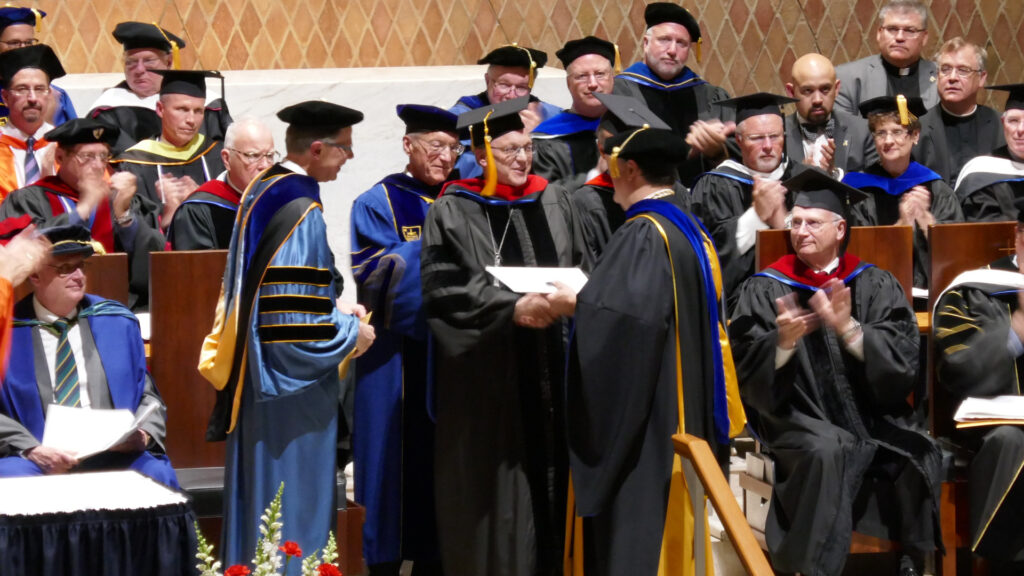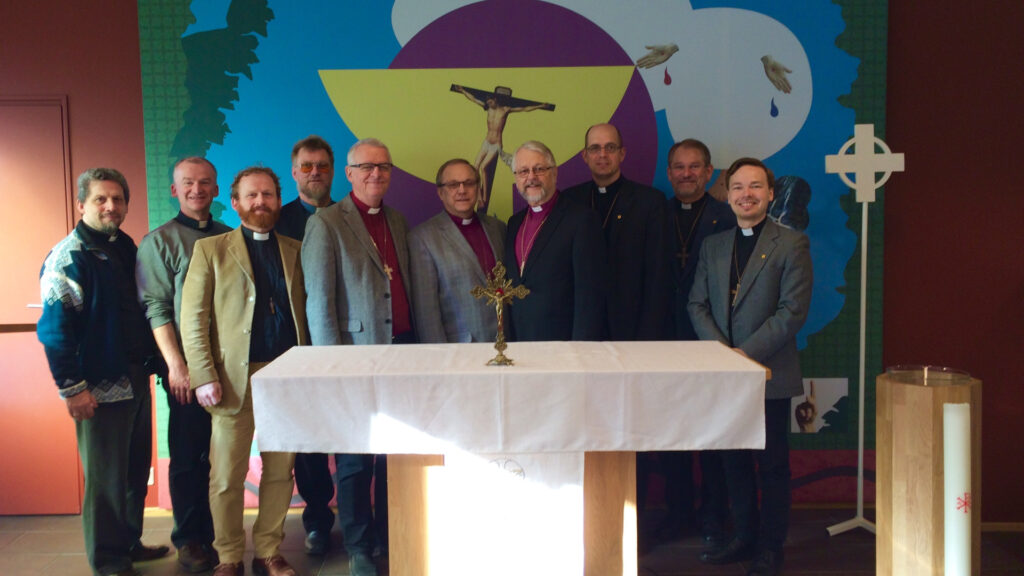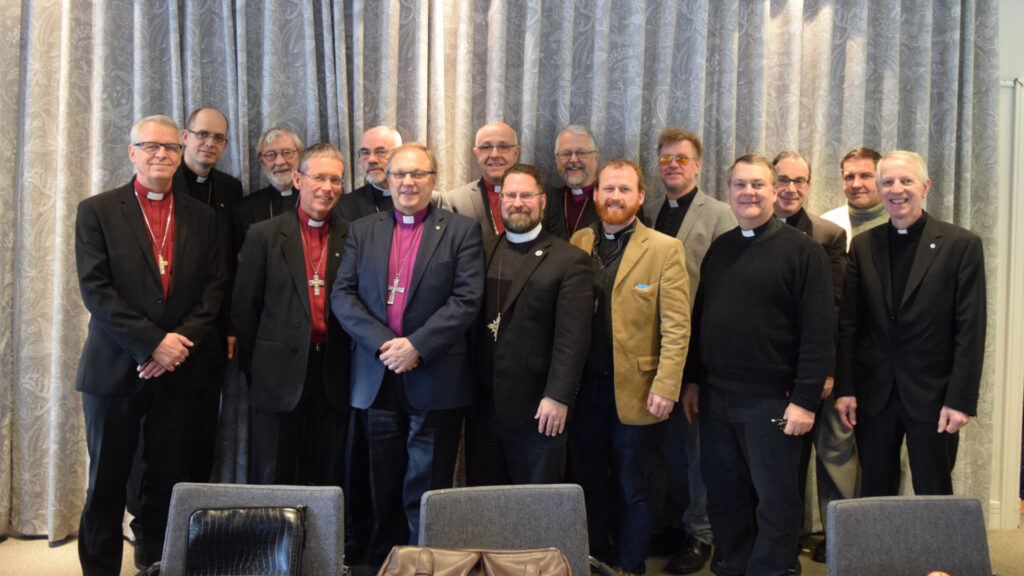

Bishop Risto receives the degree of Doctor of Divinity honoris causa, DD h.c.
The degree of Doctor of Divinity honoris causa, DD h.c., was conferred upon Bishop Risto Soramies of the Finnish Evangelical Lutheran Mission Diocese by the faculty of Concordia Theological Seminary in Fort Wayne, Indiana, The Lutheran Church-Missouri Synod. This conferment was decided on in the faculty meeting of 19 February 2018.
Dr Lawrence Rast, President of the Seminary, emphasized the significant work Bishop Soramies had carried on for the building of the worldwide Church of Jesus Christ. Soramies served over 40 years in mission work in Germany and Turkey. He is especially well-known as an expert on Islam. Ever since 2013 he has served as Bishop of the Mission Diocese Finland.
The degree was awarded to Bishop Soramies at the spring commencement of Concordia Theological Seminary in Fort Wayne on 18 May 2018.

On 15 October 2017 The Lutheran Church – Canada (LCC) Synodal Assembly resolved unanimously to sign an agreement of ecclesiastical fellowship with the Evangelical Lutheran Mission Diocese of Finland. This information was conveyed by Dr Robert Bugbee, President of LCC, immediately after the publication of the decision.
What does this mean? The Lutheran Church – Canada has already enjoyed contact with the Mission Diocese for a number of years. Dean Dr Juhana Pohjola studied and taught in the LCC Lutheran Seminary at St Catharines a few years ago. The same seminary called Rev. Esko Murto to join the teaching staff two years ago and appointed him Assistant Professor of Dogmatics last autumn. In addition, the Mission Diocese has begun cooperation with the LCC in the Odessa Concordia Theological Seminary, Ukraine, supported by the LCC, as well as the work done among the Jarai people in Cambodia.
The ecclesiastical fellowship, so-called pulpit and altar fellowship, means that the churches signing this fellowship recognise one another’s basis of doctrine and office. The members of these churches are also publicly welcome to join in Holy Communion in one another’s congregations.
Ecclesiastical fellowship naturally requires the resolution of the two parties. This year the LCC Synodal Assembly met about a month prior to the Assembly of the Mission Diocese, which then decided upon the stand of the Mission Diocese on this fellowship.
Last August the LCC and the Mission Diocese negotiated on ecclesiastical fellowship. The negotiators from Canada were President Robert Bugbee and Rev. Hamp. Finland was represented by Bishop Risto Soramies, Dean Dr Juhana Pohjola as well as Rev Dr Samuli Siikavirta. The negotiations were not held in order to adjust the two parties’ doctrines or praxis to fit one another but to assess and state their shared faith and theological foundation. The LCC and the Mission Diocese differ quite a bit in regards to their history, age and size as well as structure. We were, however, able to state that we are united by the same faith and theology, which we also confessed in the same manner.
The LCC was established in 1988 by congregations that had previously belonged to the American Lutheran Church – Missouri Synod. They still maintain warm relations with it. The church has 300 congregations in three different regions, each with its own administration. The LCC is a member of the International Lutheran Council (ILC), consisting of confessional Lutheran churches around the world. It is through the ILC that the Mission Diocese and the LCC became acquainted. Our Diocese is not yet a member of the ILC, but for several years we have been invited to attend various negotiations and conferences.
We naturally rejoice over the Canadians’ positive resolution. Our common faith and the bearing of a shared yoke is a wondrous matter. Our Diocesan Assembly met in Helsinki on 11 November 2017 where our stand on the ecclesiastical fellowship with the LCC was brought forward for due consideration and discussion. The resolution to sign this agreement on full ecclesiastical relations was reached . We rejoice in this outcome.
text: Bishop Risto Soramies
This news item has been amended to reflect the date of publication.

The independent Nordic Lutheran dioceses and the confessional Lutheran churches in Germany and the United Kingdom have taken a step towards church fellowship. At two-day-long negotiations that began in Helsinki, Finland, on Wednesday 13 April 2016, the central doctrines of the Christian faith were discussed on the basis of the Lutheran confession.
Participating in the negotiations were the Evangelical Lutheran Mission Diocese of Finland (represented by Rev. Bishop Risto Soramies, Rev. Dr. Dean Juhana Pohjola, Rev. Dr. Martti Vaahtoranta and Rev. Dr. Samuli Siikavirta), the Mission Province in Sweden (Rev. Bishop Roland Gustafsson and Rev. Jakob Okkels), the Evangelical Lutheran Diocese in Norway (Rev. Bishop Thor Henrik With and Rev. Erik Okkels), the Evangelical Lutheran Church of England (ELCE, Rev. Chairman Jon Ehlers) and as an observer the Independent Evangelical Lutheran Church in Germany (SELK, Rev. Dr. Armin Wenz).
As a result of the agreement reached in the theological discussions, the meeting stated that no hindrance was found to moving on with the establishment of church fellowship between the participating churches.
– According to the Lutheran confession, agreement concerning the proclamation of the Gospel and the administration of the Sacraments are prerequisites for church fellowship. Even if we share the common doctrinal basis of the Lutheran confession, it is necessary to discuss and find out how we understand it and apply it to our congregational life, Dean Juhana Pohjola of the Mission Diocese states.
Despite the shared faith, the negotiations made clear how different situations the participating churches are facing. The ELCE and SELK date their roots back to the 19th century and are therefore considerably older than the Nordic dioceses that have emerged in the 21st century.
The SELK with its 33,000 members and 187 congregations is by far the biggest, but it is challenged by not all of its members being active any longer. The 19th-century state of confession is so far behind that it is no longer self-evident to everyone what it means to be a confessional Lutheran.
At the same time, the SELK has in the last few years baptised ca. 1,500 former Muslims to become disciples of Christ and members of its congregations. The ‘miracle of Berlin’ is often talked about.
The ELCE’s approximately 800 active members worship in 14 congregations that are for the most part very small. The majority of its pastors and a large part of its congregants originally hail from without the UK. Lutheranism is an almost unknown concept in the country.
The ELCE does outreach e.g. through the Lutheran Radio UK whose programmes are available to listen here.
The challenge facing the Nordic dioceses, in their turn, is to stabilise ecclesial life and to grow their small congregations without the old and familiar church buildings. There is plenty of work to be done in teaching the Lutheran confession and liturgical life to parishioners coming from diverse spiritual backgrounds.
At the same time, congregations in the Nordic countries are in many places growing and strengthening. The Mission Diocese with its 32 congregations and ca. 1,800 members is nowhere among the smallest of confessional Lutheran churches in Europe.
The original raison d’être of both the Nordic sister dioceses and the confessional Lutheran churches of England and Germany, however, is something that they all share: the desire to live in a Lutheran congregation where both teaching and life are based on the Lutheran confession.
In the Nordic countries in the 21st century, Lutherans could not give in to the unbiblical decisions of the established majority churches such as the ordination of women, which is why pastors were ordained independently and congregations were founded. In 19th-century Germany, Lutherans could not accept the forced union between Lutherans and the Reformed. In 1896, German bakers living in London wanted to call a German Lutheran pastor who would not accept the doctrines of Calvin and Zwingli – only to find one in America that had received many German Lutheran refugees fleeing the lack of religious freedom in Germany.
The result of the Helsinki negotiations is a recommendation that will be taken forward. Each participating church will decide on establishing church fellowship in their particular committees and synods. The process may well take some years.
Meanwhile the Nordic sister dioceses intend to apply for membership of the International Lutheran Council (ILC). A report on the preliminary discussions with the ILC may be read here.
– Despite the slow pace of ecclesial decision making, the participants in the negotiations may already rejoice in the fellowship of faith that exists between our churches. As confessional Lutherans we are often in the minority. It is good to know that we are not alone, Bishop Risto Soramies of the Mission Diocese encourages.
Rev. Dr. Samuli Siikavirta
More on the topic:
On the website of the Mission Province in Sweden (in Swedish).
On the website of the Evangelical Lutheran Diocese in Norway (in Norwegian).

Representatives of the Nordic confessional Lutheran dioceses and of the International Lutheran Council (ILC) met in Gothenburg, Sweden, on 20 January 2016 to discuss future opportunities for co-operation.
The Nordic dioceses were represented by Bishops Risto Soramies (The Evangelical Lutheran Mission Diocese of Finland), Roland Gustafsson, Göran Beijer and Lars Artman (The Mission Province in Sweden) and Thor Henrik With (The Evangelical Lutheran Diocese in Norway), together with Dean Juhana Pohjola (Mission Diocese), General Secretary Bengt Birgersson and Bishop’s Assistant Jakob Okkels (Mission Province).
The sister dioceses were holding their biannual bishops’ meeting in Gothenburg 19–21 January. Simultaneously, the executive committee of the ILC were meeting in Gothenburg, and a joint negotiation between the two groups was arranged.
The ILC brings together confessional Lutheran churches around the Globe. Its member churches confess the biblical Lutheran faith without reservations and they are thus often minorities amongst secularised churches. The ILC encourages its members to stay true to the confession. Many of its members are young and small churches that have been born as the fruit of mission. The biggest member church, the Lutheran Church–Missouri Synod, has 2.1 million members. Altogether the ILC member churches comprise ca. 3.5 million people on six continents.
Bishop Risto Soramies of the Mission Diocese views the increasingly close contact between the Nordic sister dioceses and the ILC as natural.
– The ILC and the Nordic dioceses have already been in contact for quite some time, and it has gradually started to look meaningful for the dioceses to apply for ILC membership, Bishop Soramies states.
– The diocese are self-determining and ultimately independent of each other but have been born under similar circumstances and in many ways in contact with each other. We therefore found it useful to negotiate ILC membership together. Each Diocese will of course decide to proceed according to their own statutes and procedures, but our intention is to become members simultaneously, Soramies summarises.
The negotiations in Gothenburg clarified the situation on both sides. The Nordic mission dioceses have been born on old Lutheran territory and represent a long Lutheran tradition, whereas most of the other member churches in the ILC are new beginnings of Lutheranism in the world.
– The Nordic dioceses got a clear idea of the character and activity of the ILC and what it requires of its members. The ILC executive committee understood many things about our dioceses, Bishop Soramies reports.
‘Mission’ is written in the very name of the Mission Diocese. Domestic and foreign mission cannot be separated from each other. By applying for ILC membership, the Mission Diocese seeks to become part of a community that reaches people all around the world with the pure Word and with the Sacraments administered according to Christ’s institution.
– Christendom and the whole world need biblical preaching and teaching. The Means of Grace given by God must be taken to all peoples, just as Jesus commanded, “Go therefore and make disciples of all nations, baptising them in the name of the Father and of the Son and of the Holy Spirit, teaching them to observe all that I have commanded you,” Bishop Soramies concludes.
The article was first published in Finnish in the Pyhäkön Lamppu magazine 1/2016 of the Luther Foundation Finland, a supporting organisation of the Mission Diocese.
You may read another report on the meeting by visiting the ILC Online website.
The Evangelical Lutheran Mission Diocese of Finland is an independent confessional Lutheran body founded in 2013 that comprises 32 congregations with ca. 1,800 members nationwide (February 2016), in addition to many more non-members in attendance. You may read more about the identity and confession of the Mission Diocese in English here and access our news archive here.